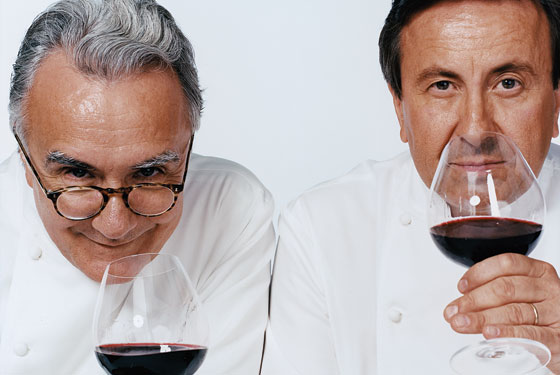 |
Alain Ducasse and Daniel Boulud, drinking buddies.
(Photo: Mackenzie Stroh) |
The wine bar as we know it is a casual affair, a catchall category inhabited by small plates, panini, and patrons more interested in by-the-glass socializing than four-star feasts. With two of the world’s fanciest French chefs opening so-called wine bars this fall (granted, as part of full-fledged restaurants), that’s about to change. It’s not as though wine hasn’t always loomed large in the gastro-empires of Alain Ducasse and Daniel Boulud; it’s only a question, as they tailor their new ventures to the popular trend, of exactly how rustic and unbuttoned those two Gallic superstars are constitutionally capable of being.
You can’t blame them for joining the viticultural fray, though. In New York’s continuing casualization, wine bars are becoming the antidote for all things perceived as stuffy and mannered (including most fancy French kitchens, the late Alain Ducasse at the Essex House among them). They’ve infiltrated nearly every neighborhood—not least the Upper West Side, where Bar Boulud opens this November opposite Lincoln Center. Skeptics might say that Bar Boulud will be a bar like Café Boulud is a café, which is to say, hardly. And with prices only 20 percent less than Boulud’s not-cheap DB Bistro Moderne and a gelée garnish here and there, they’d be partly right. But in tribute to the unpretentious “bouchons” of his native Lyon—Thomas Keller had already snagged the name, sadly—Boulud is dispensing with some fine-dining trappings (tablecloths, elaborate menus) in favor of a communal “tasting table” and diner-style booths. And unlike Daniel, with its wealth of vintage Bordeaux, Bar Boulud showcases Rhône and Burgundy wines, including the Beaujolais that wine director Daniel Johnnes believes go so well with the pâtés and terrines made in-house and sold retail during the between-meals lull.
Ducasse won’t be hawking takeout saucisson at his new Adour, the wine-centric restaurant he plans to open at the St. Regis Hotel in November. But he has enlisted David Rockwell to install such oeno-geeky touches as temperature-controlled armoires and 50 private wine lockers. Make no mistake: Adour is full-on Ducasse—predictably luxurious, pricey, and refined. In what can be considered a new informality, though, Ducasse is installing a four-seat wine bar, with interactive technology that projects tasting notes on the bar top, and relatively casual lounges for drinks and appetizers.
For a more proletarian take on French wine, Bar Veloce’s Frederick Twomey and Daniel alum Christophe Chatron-Michaud transform Teresa’s Polish coffee shop into Solex, a cork-ceilinged spot serving lesser-known varietals and an oven-based menu of savory tarts, quiches, and soufflés. Marseille in the theater district spawns Nizza, featuring French Riviera flavors and wines lively enough to withstand the pungent anchoiade-and-tapenade onslaught. For those who believe the only true wine bar is an Italian wine bar, there’s Bacaro, Peasant chef-owner Frank DeCarlo’s ode to the Venetian cicchetti bar, and Terroir, a 25-seat spinoff of Hearth, where partners Marco Canora and Paul Grieco offer a snacky, Italian-inspired menu and a worldly wine list.
Aficionados will even get their chance to custom-blend their own bottles when Long Island’s Bridge Vineyards opens its “urban winery” in Williamsburg for barrel samplings, classes, and dinners. For New York wine lovers, it’s shaping up to be a fruit-forward fall, with a terrific finish.

